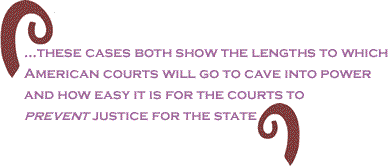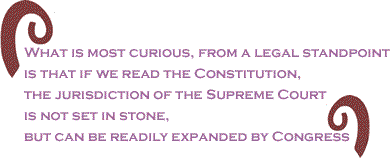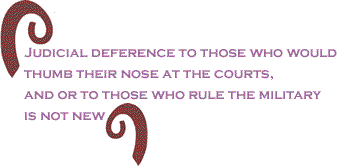
|
|||||||||||||||||||||
|
The current issue is always free to all readers If
you need the access available to a |
|
 |
|
Unbalanced? Check! If you review a standard American government textbook (employed at any level from elementary, middle, high school or with undergraduates), you will see various sections, if not entire chapters, explaining that there are three branches of government, that said branches are relatively autonomous, and that each branch can exercise control over the others. Too often, my undergraduate students chanted the words “checks and balances” without having a clue as to what the term means. Although Ann Coulter, Laura Ingram and other wannabe fascists provide the wrong justification in claiming that courts are not vested with the check of judicial review (they say that such is not written in the text of the Constitution), in practice, in the most important areas of government action and policy, American courts only exercise their check to certify or allow executive power. As the details of the detainee abuses in the so-called War on Terror continue to bubble up through lawyers and leaks, we can see the coveted role of government ministers enjoyed by judges who hold a rubber stamp, and we understand why people like Maher Arar or Khalid El-Masri will never obtain satisfaction in American courts. Marbury and McCulloch, a primer In the aforementioned textbooks, usually in some chapter on Congress or the early years of the republic, authors will trot out two cases that we are told to hold in reverence: Marbury v. Madison, and McCulloch v. Maryland. Summarized without context, discussion of economic class, judicial theory or extrapolations as to what the ill-effects of the rulings were, publishing houses allow editors and authors to describe the cases as brilliant legal scholarship that uphold some ideal principles unique to the best of America. Of course, in providing some background and detail, my students easily read my disgust with both the language of the opinions and the blind appreciation for the holdings. Supposedly fundamental cases, which announced the boundaries of the power of federal courts, the meaning of the Constitution, and powers of Congress, put together, these cases both show the lengths to which American courts will go to cave into power and how easy it is for the courts to prevent justice for the state. In Marbury, the issue in question was whether the appointments of Federalist John Adams, made in 1801 (prior to the swearing in of Jefferson), were to take effect. William Marbury and others were approved by the Senate to several federal judicial offices, but the incoming Secretary of State, James Madison (a Democratic-Republican), refused to deliver the sealed commissions. In dismissing the suit that was filed directly with the Supreme Court, Chief Justice John Marshall found that the Judiciary Act of 1789, which purportedly only enabled parallel language in the Constitution, giving the Supreme Court original jurisdiction in Marbury’s case, was unconstitutional. Marshall reasoned that, under the Constitution, Article III, the Supreme Court had original jurisdiction in few circumstances and the Congress could not expand that jurisdiction. As he saw it, the Judiciary had expanded such jurisdiction, hence, the Act was void and Marbury’s suit was dismissed.
What is most curious, from a legal standpoint is that if we read the Constitution, the jurisdiction of the Supreme Court is not set in stone, but can be readily expanded by Congress. Note the text reads: Article III, Section 2: “In all cases affecting ambassadors, other public ministers and consuls, and those in which a state shall be party, the Supreme Court shall have original jurisdiction. In all the other cases … the Supreme Court shall have appellate jurisdiction … with such exceptions … as the Congress shall make. Looking at the case politically, however, the result was expected. As Secretary of State, Marshall and his brother (who later represented Marbury) had failed to deliver the commissions before the ascension of Jefferson, and the new Secretary of State, James Madison. Further, Marshall knew that if he gave an order to Madison, the Secretary would ignore it and the Democratic-Republican Congress would not seek to punish or impeach those who rejected the court order; instead, Marshall might be on the chopping block. Similarly, the opinion in McCulloch v. Maryland requires mental gymnastics if one assumes that legal reasoning, over politics, controls the opinion. In 1816, the Congress chartered a bank, clearly an unconstitutional act and unnecessary. Banks are in the business of making money; governments are created to promote liberty. Banks make money via taking deposits and selling those deposits in the form of loans with interest; governments obtain revenue via taxes, levies, tariffs, user fees, licenses, and fines. Nevertheless, the State of Maryland figured that they would make it impossible for the bank to function in their state. Maryland both required all banks operating in their state to be chartered by the state government and taxed all banks operating in the state which were not chartered there. Such was clearly legal by the State of Maryland as such was and is not prohibited by the Constitution (see Article I Section 10 – prohibitions on the States, Article. IV, and Amendment X).
Remarkably, Marshall took the so-called “elastic clause”, which only refers to the specific list of enumerated powers in Article. I, Section 8, clauses 1-17, and said that Congress can do nearly anything under the sun (foreshadowing the Military Commissions Act?) AND that the Constitution implies that states cannot tax federal entities – regardless if such are purely commercial endeavors. Again, given the absurdity of the legal argument, the politics explain the decision. The federal government would neither allow its bank director to sit in some prison in Maryland nor let its money to be taken by some state tax collector or sheriff. But by ruling on the side of power, for the sake of or in support of power, Marshall laid the groundwork whereby the worst abuses – i.e. imprisonment without charge or ability to challenge, or imprisonment due to one’s status and birth – would become commonplace. Worse yet, even when the courts find executive or Congressional action reprehensible or questionable, they utilize the Marshall Plan and grant permission for the practices to continue. What About Today? As reported by American University law professor, Herman Schwartz (Legal Times), Michael Ratner (Center for Constitutional Rights) and others, if we look at the cases of Yasser Hamdi, Shafiq Rasul, Lakhdar Boumediene, Khaled al-Odah, Salim Hamdan and the hundreds more they represent, we see a constant pattern of legal reasoning looking like an acute case of spina bifida or fantastic assumptions that rival the imagery of Lewis Carroll, e.g., Mock Turtles and Mock Terrorists, would-be monarchs screaming off with their heads, and first establishing conviction, then holding trials. Consider the detainees have had to litigate for five years, just to claim the right to get to court in order to challenge their detention. Though the Supreme Court ultimately ruled that detainees are in U.S. territory (i.e. Gitmo) and hence the courts have jurisdiction to hear petitions demanding release, subsequent lower courts have declared either that the U.S. military base at Gitmo is not in their jurisdiction, or that Congress stripped the courts of jurisdiction to hear the cases. Further, while Bush has said that “we don’t torture” and the Supreme Court said that detainees cannot be tortured, under the Detainee Treatment Act (2005) and the Military Commissions Act (2006), detainees are barred from bringing lawsuits to be compensated for past or to prevent future acts of torture. And when the Supreme Court made specific rulings about the capture of non-American citizens, “fighters”, captured on the “battlefield” (supposedly Afghanistan) by U.S. troops or her “allies” (e.g. Northern Alliance drug dealers) and the rights and protections due said detainees, other courts have generalized the narrow ruling to apply to Americans grabbed in airports on phony warrants, European nationals kidnapped by the CIA, and goat herders sold by mercenaries to other mercenaries.
Most recently, the Supreme Court refused an expedited appeal to deal with the question of the kangaroo courts, aka military commissions – although the Court had already described the minimum standards to make the procedures lawful. Note that under the Military Commissions Act defendants are presumed guilty of being unlawful enemy combatants (which is worse that being a terrorist), and both confessions extracted from torture and secret evidence can be used to justify the conviction – which allows for the penalty of death. There are two general explanations for the decision of the high court to let the sham continue. On the one hand, the Clarence Thomas wing believes in absolute power of the emperor. On the other hand, the justices know their place and dare not raise opposition. After all, who loves a terrorist? I guess we should all ignore those Disney videos used at Camp X-Ray to deal with the al-Qaeda youth brigade. Precedents in Appeals to Power As explained above, judicial deference to those who would thumb their nose at the courts, and or to those who rule the military is not new. In other columns, I have argued that most judges are not brilliant legal minds, but suck-ups to power. After all, it is easier to be right when anyone who counts agrees with you. In 1993, after years of abusing Haitians fleeing political repression, the Supreme Court heard the case of Sale v. Haitian Centers Council. The standard practice, started by Reagan and continued by G. H. W. Bush was to set up a Coast Guard flotilla, arrest any and all Haitians in a boat – and sink the boat, if it were not already listing. Post arrest, the detainees were either put in an American prison, or handed back to a military dictatorship, run as a kleptocracy. While law professor Harold Koh actually won a reprieve at the appellate level, when a court ordered the Coast Guard to cease and desist, that very court stayed its ruling until the Supreme Court had a chance to deal with the Haitian problem. Remarkably, voting 8-1, the Court found that the practice of kidnapping and piracy was legal and did not violate other federal laws or treaties which overtly prohibited the practice. Similarly, when a district court in South Carolina held that Jose Padilla could not be held by the Bush military without charge as a war criminal, the judge gave Bush attorneys 45 days to appeal and stayed its order to release Padilla. In both instances, even when judges articulated a position that favored the meek, they enabled fiat to carry the day. Legal Lessons from Another War Undoubtedly, if one were to dig deep into American history, there are instances when court decisions sided with truth and justice against power … but such are outweighed by the oft-cited precedents. Further, one little known case that took place during a long-ago war probably serves as the best reminder as to why our judges are loathe to resist the men holding the fasces. By the 1830s, long after the American genocide program was well underway, the Cherokee Nation went to American courts to obtain relief from the State of Georgia. Justice John Marshall (yes – the same justice from Marbury and McCulloch) would not support a petition by the Indians, who asked for their ally in Washington to send in the troops. Marshall ruled that as Indians, they were not the kind of people who could sue in federal courts. However, when a White minister, Worcester, who was also the Post Master of the U.S. federal outpost on the Cherokee Nation was imprisoned, the Federalist could not sit on his hands.
Worcester rejected Georgia laws that required him to swear allegiance to the government of Georgia and obtain a passport to work in Cherokee Nation. For his position, Worcester was arrested. When his appeal reached the Supreme Court, Marshall determined that the Cherokee Nation was a legal entity, separate from the State of Georgia and that Worcester could not be found to have violated Georgia laws as he had not been under the jurisdiction of the State. But given the relative strength of the federal government (vis-à-vis the states) in the 1830s and the political will of then president Andrew “Indian Killer” Jackson to uphold a federal court ruling at the expense of good White people of Georgia who were only trying to eliminate the Indian problem, the fallout of the case Worchester v. Georgia was no surprise. Marshall ordered Georgia to release Worcester and Jackson said, “Marshall made his ruling, let him enforce it.” A few years before his death, then Justice Thurgood Marshall was asked about the ruling of Roe v. Wade and the possibility that it might be overturned. Marshall insisted that he believed in the court. By that, he meant that American jurists will always uphold individual liberty and justice over improper intrusions of the state. Conversely, in a presentation in 1991, historian Howard Zinn argued that we can never trust our freedom and rights to the good will of government ministers and judges. The Bush “war on terror” and his ministers of justice and on the bench have found myriad ways to justify torture, strip habeas corpus, and allow any person, found any where on the planet, to be held in some dungeon or tortured whole for eternity. If we are to learn from America’s legal history, we must recognize that the courts will not seek to rein in empire or dictatorship. BC Columnist Dr John Calvin Jones, PhD, JD has a law degree and a PhD in Political Science. His Website is virtualcitizens.com. Click here to contact Dr. Jones. |
|
| Home | |
| May
17, 2007 Issue 230 |
||||||||||||||
|
||||||||||||||
| Printer Friendly Version in resizeable plain text format | ||||||||||||||
|
|
||||||||||||||
 |
||||||||||||||
 |
||||||||||||||
 |
||||||||||||||
| |
||||||||||||||
| |
||||||||||||||





































